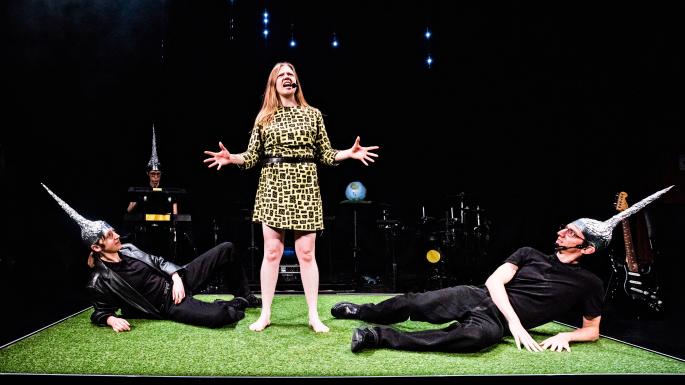All the lights are on, but is there anyone in the house? Eat your heart out, Jacques Derrida – David Deutsch, David J Chalmers, Max Tegmark, and Nick Bostrom are the menu of the day, summonsed to the stage by Little Bulb theatre company to explore The Future, in which three boffins in black (with fetching silver-foil pointy hats) and a charismatic new-age arty philosopher (in a yellow-and-black Aboriginal print dress) channel the spirit of a whole bunch of scientists, cosmologists and forward thinkers on the subject of AI and human progress (or not).
Imagine a TED talk with breaks for physical theatre workshop games (‘Let’s all be snakes. Or Eagles.’) – together with some mighty fine polyphonic a capella singing. Oh, and sometimes the four cast members become a band (guitar, bass, drums, keyboard), turning it all into a kind of prog-rock space opera.
It’s Little Bulb, so of course it’s zany and fun and brimming with good ideas. Does it work? Not quite. Perhaps, to this jaded reviewer, it’s a case of ‘been there, done that’. The ideas on the table are familiar ones, first explored in the 1920s by Czech writer Karel Čapek, who invented the word ‘robot’; and subsequently developed in the 1940s by Isaac Asimov, in the stories and essays that would be published as I, Robot – in particular, his introduction of the Three Laws of Robotics. And on it all went, through Kubrick’s 2001: A Space Odyssey to Spike Jonze’s Her.
From the very beginning, as soon as the idea of a robot, or the notion of artificial intelligence, entered the sphere of human enquiry, writers and thinkers started to explore what this meant, and the worries kicked in… and going on what we witness here, not a lot has changed. Life 3.0 citing the possibility of an AI Apocalypse feels like Emperor Asimov in new clothes.
So, off we go with the familiar questions: What does it mean to be human? What do we mean by consciousness? How do we keep control of our inventions? At what point do we cease to be the master and become the slave? Can a non-organic being be thought of as having consciousness? Is it reasonable to say that progress can’t be denied, even if it leads to our demise? And will the death of (hu)mankind lead to the death of consciousness? Past, present, future – are we at the start, the middle, or the end of human civilisation?
All this and more is raced through breathlessly… it’s exhausting. And although I appreciate the referencing and parody of the TED talk format – ideas upon ideas, a rush of animated words delivered through tinny radio mics – I don’t personally enjoy it too much. My brain hurts. It’s a personal thing – I like my ideas digested in slow, cautious media formats: books, newspapers, radio broadcasts…
I find the trio of boffins a bit tiresome, but I do understand why the company felt that exploring the clichés about male scientists and intellectuals, through having two of the ‘men’ played by women, and seeking out the clown qualities of each expert, was an interesting idea. Plus, robots turning on their masters is an obvious subject for a physical theatre skit. It’s all done well, but to my eyes and ears, it’s only mildly amusing.
On the plus side, company co-founder Clare Beresford is magnificent as Marina, a kind of super-hybrid of David J Chalmers (in whose honour she adapts an Australian accent to enthusiastically present his ‘crazy ideas’), and performance art enfant terrible Marina Abramovic, tossing her hair like a 60s hippy Eve, running barefoot around the astroturf with gay abandon as she muses on how boring the Garden of Eden would be, and how long it’d take before she gave in to the desire to burn it down. And it is always great to see a gal behind a drumkit.
The scenes/narrative threads that go beyond the usual worries about AI into more interesting reflections on future problem-solving – how we cope with the coming environmental crisis, a scientific theory that can encompass artistic reflection, an acceptance of fundamental consciousness as something shared by all living things – are the more interesting ones. To my mind, at least. It’s all subjective, even the view of what is subjective and what is objective.
As far as staging goes, this is a simple set-up, without the familiar Little Bulb paraphernalia of cardboard props and signage, and dressing-up box gowns and wigs, and the like. The lighting design (by Fraser Craig) is mostly responsible for holding the space – and it does its job ably, with strings of lights of changing colours suggesting, at various points, a psychedelic gig, the infinite cosmos, and a scientific lab in the dead of night. The glowing light box that often takes centre-stage attention is at once Pandora’s Box, the Intelligent Machine, and the Holy Tabernacle of the Ark.
The unaccompanied barbershop style singing is superb, and the synthesised prog rock channels the spirit of the Spooky Tooth meets Pierre Henry experiments, and delivers the result with a goofy knowingness. Cosmic, man!
As with earlier work, the show is co-devised by the performers (in this case, the aforementioned Clare Beresford, with boffins played by the company’s musical director Dominic Conway, and Little Bulb regulars Eugénie Pastor and Shamira Turner); and it is directed, as are all the company’s shows, by co-founder Alexander Scott.
It’s a new show, and that shows. It ebbs and flows, playing with the show-within-the-show format, as our intrepid team whizz around the world from conference to conference. The last few scenes are stronger than the early scenes, the show interrupting its own set-ups with ever more urgency. The Future currently feels a little young and unsteady, like a foal just finding its feet – but it’ll grow and develop, I’m sure.

